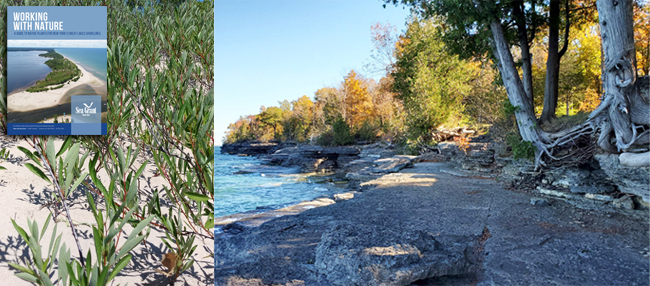
Far right: As noted in NYSG’s Working with Nature guide, sand cherry helps stabilize NYs Great Lakes dunes. Near right: The harsh environment of the bedrock shores along the Lake Ontario shoreline in Jefferson County, NY. Credit: Roy Widrig/NYSG
Contact:
Roy Widrig, NYSG Great Lakes Coastal Processes & Hazards Specialist, P: 315-312-3042, E: rlw294@cornell.edu
New York Sea Grant responded to the strong need for educational materials on native plants in New York State with a new guide to more than 40 species and their ideal coastal locations.
Oswego, NY, August 10, 2022 - With high interest by New York environmental organizations for promoting the use of natural and nature-based features for shoreline ecosystem restoration, there existed a gap in resources detailing native, erosion-resistant and water-loving plants in New York State for homeowners and environmental practitioners.
Through extensive field work, photography, and research, New York Sea Grant (NYSG) developed a 28-page Working with Nature Guide: A Guide to Native Plants for New York’s Great Lakes Shorelines with full-color photos of more than 40 native plants that thrive in New York’s Great Lakes’ coastal areas. Additionally, this guide provides best practices for natural and nature-based erosion management techniques as well as detailing the various coastal settings in New York and the plants that fit those settings.
In its first eight months of publication, more than 100 copies of the Working with Nature guide were distributed to shoreline residents and others working along the state’s freshwater coastlines to aid in the restoration of New York’s shorelines across all of the state’s Great Lakes coastal counties. The guide can be accessed online (pdf).
Project Partners:
• Funding: New York State Department of Environmental Conservation
• Cornell University Master Gardener Volunteers
More Info: New York Sea Grant
New York Sea Grant (NYSG), a cooperative program of Cornell University
and the State University of New York (SUNY), is one of 34 university-based
programs under the National Oceanic and Atmospheric Administration’s
National Sea Grant College Program.
Since 1971, NYSG has represented a statewide network of integrated
research, education and extension services promoting coastal community
economic vitality, environmental sustainability and citizen awareness
and understanding about the State’s marine and Great Lakes resources.
Through NYSG’s efforts, the combined talents of university scientists
and extension specialists help develop and transfer science-based
information to many coastal user groups—businesses and industries,
federal, state and local government decision-makers and agency managers,
educators, the media and the interested public.
The program maintains Great Lakes offices at Cornell University, SUNY
Buffalo, SUNY Oswego and the Wayne County Cooperative Extension office
in Newark. In the State's marine waters, NYSG has offices at Stony Brook
University in Long Island, Brooklyn College and Cornell Cooperative
Extension in NYC and Kingston in the Hudson Valley.
For updates on Sea Grant activities: www.nyseagrant.org has RSS, Facebook, Twitter, Instagram, and YouTube links. NYSG offers a free e-list sign up via www.nyseagrant.org/nycoastlines for its flagship publication, NY Coastlines/Currents, which is published quarterly.